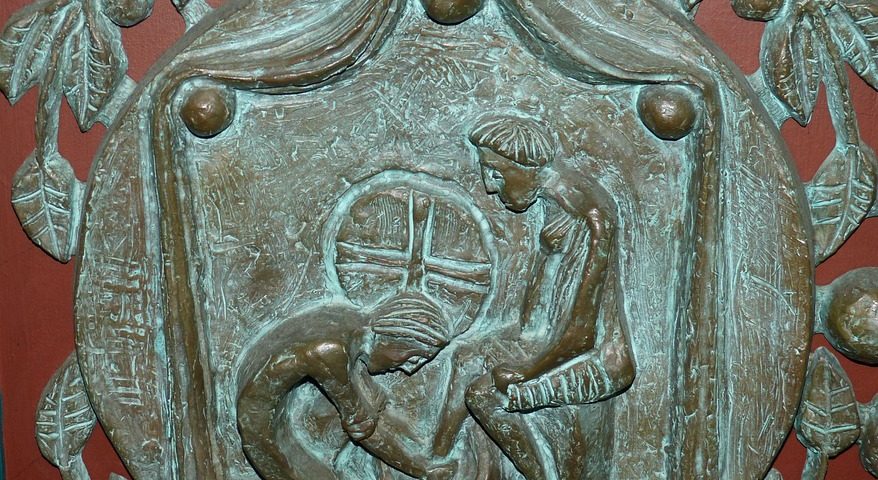To put it very simply, what we do this evening is what faithful people have always done and will until the end of time: since Egypt, since the desert, since Christ, and unto the heavenly Jerusalem. It is why we are here.
It is why we are here in this place, this home, this spiritual comfort, our church. And it’s also why—like a gift—our friends, our spiritual fathers, our beloved Jesuits have come to celebrate with us this evening. They who taught so many of us how to be faithful, we continue to be faithful with them and they with us. We gather together and worship with them on this night, because this is the night we touch the beating heart of our faith—the love of God which still loves, the love which feeds us.
Since the garden he has fed us; even after sin he fed us.[1] In Egypt when he fed us, he liberated us from bondage; God taught us then that by means of a meal, he can set us free.[2] In the desert he revealed himself in a sacred meal; the elders, half-way up the mountain it says in Exodus, ate and drank, and “they beheld God.”[3] By that God taught us that by means of a meal, we can enter the mystery; we can see him.
And so, the prophets dreamed. “On this mountain,” Isaiah prophesied, “the Lord of hosts will provide…a feast of rich food.” It’s a feast, he said, which would “destroy death forever.”[4] By that God prepared us to see in this meal the gift of eternal life. And that’s because—as God said through Ezekiel—“I will feed them…I myself will be the shepherd of my sheep.”[5] Because that’s just what God does; it’s the witness of the whole of scripture. He feeds us, because he loves us so.
And so, we think of Jesus, remembering all those times he fed his disciples and all those who wandered with him. By the light of scripture, we know what he was doing. He too dreamed, like Isaiah, of a time when those from the east and the west will recline at Abraham’s table.[6] He too dreamed of food that would free us and draw us into the eternal life of God. He too—saying, “my flesh is true food”—said, like Ezekiel, “I will feed them.”[7] He too, just like God, as God, feeds us, because he loves us so.
Which, as I said, is why we are here, because of the hope of prophets and the word of God. As we have gathered around this altar for so many years, gathering even in homes and in hearts in this parish for more than a half-century, so we are here again tonight out of obedience to Christ, who loves us so. Tonight, we are simply faithful; in that, nothing has changed. We are in the desert. We are in the Upper Room. We are here. And so is God. And he is feeding us, saving us, saving you and me.
But what does this mean when—as we are—we’re separated from each other? Does it mean that since we cannot gather, God’s power to feed and free us is taken away? Cut off from the Altar, does it mean you are cut off from God? In name of Jesus listen to what I say: The God we worship is almighty, you’ll remember; he created the universe; he rose from the dead; trust me, he can find a way into your heart. This is mystical food, my friends; and so, mystically consume it. And then move on to learn the deeper lessons of the Eucharist—not just how to receive the Eucharist, but how to be Eucharist for others.
Which is the lesson of the washing of feet, that symbol of Christ’s death. To share in Christ at all, we must share in his death. To share in Christ’s death, we must die to sin and to prideful self. We mustn’t serve ourselves alone, but others too—even to the point of sacrifice, even death. We must remember that to betray Christ today is to betray our brothers and sisters in need; that is, to abandon the Eucharist is to refuse to serve, to refuse help to those in need.
Which is why if you’re wondering where the Eucharist is, you can find it being celebrated wherever someone is serving others—in a hospital, in a home, on the street, in the heart of someone simply doing his or her job, afraid for themselves and for their families, but still at work; in a phone call, even, a conversation with the lonely. In these strange pandemic days, that’s where we must look for the altars of Christ. That is what we must remember, that this is the food the world needs now: the food which is your love and your service, the bread of Christ which is you.
You, who are Christians, who have once eaten the body and the blood—for the life of the whole world. Amen.
[1] Genesis 1:29; 9:3
[2] Exodus 12:1-28
[3] Exodus 24:1-11
[4] Isaiah 25:6-8
[5] Ezekiel 34:14-15 English Standard Version
[6] Matthew 8:11; Luke 13:29
[7] John 6:47-57; Ezekiel 34:14
© 2020 Rev. Joshua J. Whitfield










